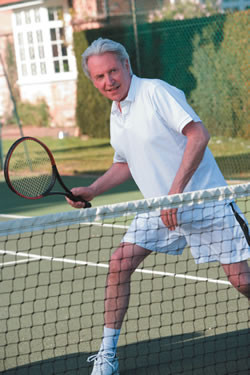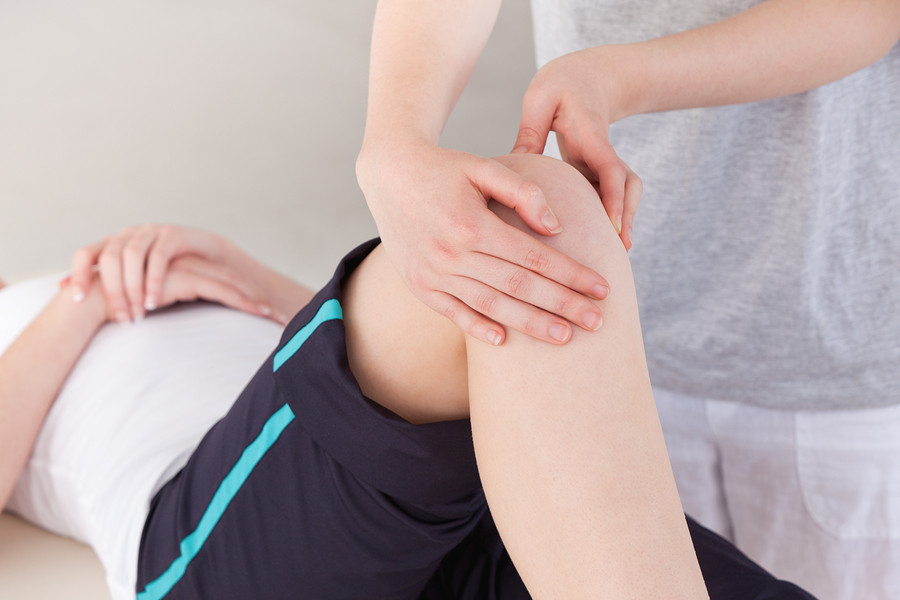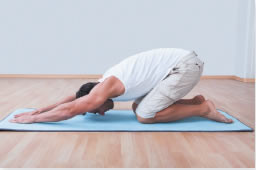
5 timeless habits for better health

What are the symptoms of prostate cancer?

Is your breakfast cereal healthy?

When pain signals an emergency: Symptoms you should never ignore

Does exercise give you energy?

Acupuncture for pain relief: How it works and what to expect

How to avoid jet lag: Tips for staying alert when you travel

Biofeedback therapy: How it works and how it can help relieve pain

Best vitamins and minerals for energy

Should you take probiotics with antibiotics?
Exercise & Fitness Archive
Articles
Active older men live longer
Men who want to live longer would be wise to remain physically active as long as possible, according to a long-term study of aging in older men reported in the British Journal of Sports Medicine.
In 1972–73, the Oslo Study recruited nearly 15,000 Norwegian men ages 40 to 49. In 2000, the surviving participants filled out a survey about their daily physical activities. This included everything from couch-potato time in front of the TV to vigorous athletic workouts several times a week.
Know your triglycerides: Here's why
The level of triglycerides in the blood, like measurements of "bad" cholesterol, helps to gauge your risk for heart disease. Image: Thinkstock |
High levels of these fatty particles in the blood means you may need to step up healthy lifestyle changes.
When the doctor prescribes physical rehabilitation
Make sure you communicate with your rehab team, and speak up if something in the program isn't working for you. Image:Thinkstock |
Here's how to get the most out of physical therapy and cardiac rehab.
Ask the doctor: I have pelvic organ prolapse. What types of exercise should I avoid?
Q. I have pelvic organ prolapse and work out at the gym almost every day. Are there any forms of exercise that will make my situation worse?
A. Pelvic organ prolapse results from weakened muscles and ligaments of the pelvic floor, which allow your bladder or uterus to drop and press against the walls of the vagina. You didn't say what type of exercise you do at the gym, but there are a few you should avoid—lifting heavy weights, especially over shoulder height; high-impact aerobic activities involving jumping or hopping; and sit-ups. You should check with a trainer at the gym to see how you can modify strength training, core exercises, and aerobics to reduce stress on your pelvic floor.
Can you put off that knee surgery?
Don't assume surgery is necessary if knee pain sidelines you. Physical therapy may be all it takes. Image: iStock |
Physical therapy and weight loss can relieve knee pain and protect your mobility.
Yoga offers range of health benefits
In yoga, you assume a series of postures that build strength and flexibility. Images: Thinkstock |
This ancient practice may support heart health, general fitness, and mental well-being.
Gain more weight, get more GERD
Maintaining a healthy weight is the best way to rein in gastroesophageal reflux disease (GERD), or chronic heartburn, according to a study in The American Journal of Gastroenterology. Researchers found that GERD symptoms increased for every incremental rise in body mass index (BMI), which measures the ratio of weight to height.
In GERD, the acidic contents of the stomach back up into the lower esophagus, causing burning pain. The most effective treatment for GERD is taking an acid-reducing proton-pump inhibitor medication, such as omeprazole (Prilosec). People who are overweight are much more likely to develop GERD.
Shoulder pain? Here's what you can do to treat it and prevent it
A few simple measures can protect your most flexible joint and put it back in service after overuse or injury.
All you need to do is rotate your arm to realize what a marvel your shoulder is. It's the body's most flexible joint and one of the most essential. Whether you're reaching the top shelf, swinging a golf club, or washing your hair, "it's the one joint you can't stop using," says Karen Weber, a physical therapist at Harvard-affiliated Spaulding Rehabilitation Network. "We do a lot of repetitive motions with our arms. When our shoulder muscles aren't strong, we can set ourselves up for injury," Weber says.
Add strength training to your fitness plan
Muscles at workDynamic resistance occurs when muscles and joints move, such as when you raise and lower a hand weight. Image: Thinkstock |
Boosting your muscle mass may trigger changes that enhance heart health.
Walkers: Take steps to enjoy this great mobility tool
Work with a physical therapist to learn how to use a walker to best advantage so you can take back your independence.
Walkers can put you back in action if you're recovering from an injury or surgery, or if you're struggling with balance and gait problems, fatigue, or muscle weakness. "Walkers help give people their independence back. They improve daily function, and they reduce the risk of falling," says Dr. Clare Safran-Norton, a physical therapist and clinical supervisor of rehabilitation services at Harvard-affiliated Brigham and Women's Hospital.

5 timeless habits for better health

What are the symptoms of prostate cancer?

Is your breakfast cereal healthy?

When pain signals an emergency: Symptoms you should never ignore

Does exercise give you energy?

Acupuncture for pain relief: How it works and what to expect

How to avoid jet lag: Tips for staying alert when you travel

Biofeedback therapy: How it works and how it can help relieve pain

Best vitamins and minerals for energy

Should you take probiotics with antibiotics?
Free Healthbeat Signup
Get the latest in health news delivered to your inbox!
Sign Up











